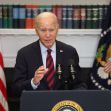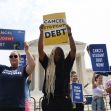Late last week, the U.S. Supreme Court ruled that President Joe Biden’s plan to forgive federal student loans exceeded his executive authority. The Court’s decision will prevent tens of millions of indebted Americans from seeing as much as $10,000 or $20,000 in student debt erased.
The 6-3 majority ruling was not a surprise for legal commentators and court watchers. The President’s loan forgiveness plan drew legal challenges from conservative states and other activists the second it was announced. Ultimately, the Court’s opinion concerned two parallel cases, one led by two student loan borrowers and the other helmed by six Republican-led states--Arkansas, Iowa, Missouri, South Carolina, Kansas, and Nebraska.
In each case, the plaintiffs argued that the Biden administration exceeded its authority in canceling upwards of $430 billion in debt without the approval of Congress. The biggest issue faced by both sets of plaintiffs was procedural in nature: To bring a lawsuit, a plaintiff must have standing. To have standing, the plaintiff must show that they have actually been injured by the conduct they seek to challenge. The administration argued that neither the states nor the individual borrowers were harmed by the government's choice to forgive other borrowers’ loans.
The majority ruled that the State of Missouri, at least, had established standing. The federal government’s plan would discharge federal loans, many of which are being serviced by the Missouri Higher Education Loan Authority (MOHELA). Canceling those debts would hurt MOHELA’s bottom line, the Court reasoned, which would in turn harm the state.
Many legal experts and advocates for debt relief have been highly critical of the Court’s reasoning. MOHELA is a quasi-governmental entity but is distinct from the state; MOHELA’s debts are not the state’s debts. Moreover, commentators pointed out that many loan servicers would actually generate more revenue under the plan, meaning Biden’s plan wouldn’t actually harm MOHELA. In any case, if MOHELA had concerns about the administration’s loan forgiveness plan, MOHELA could have sued on its own. The loan servicer chose not to do so, but the Court was content to let Missouri claim MOHELA’s woes as its own.
The Court’s determination to decide on the matter despite stretching the limits of legal standing echoes another landmark decision delivered last week. In 303 Creative LLC v. Elenis, the Court chose to rule that a religious web designer could refuse service to gay couples even though the plaintiff was never actually asked to work on a same-sex wedding and, in fact, had not yet even entered the wedding website industry. Once again, the case was decided along political party lines, with the Court’s six conservative justices delivering the majority and the three liberal justices vigorously dissenting.
President Biden had harsh words for the Republicans who fought so hard against the loan forgiveness plan: “They had no problem with billions in pandemic-related loans to businesses — including hundreds of thousands and in some cases millions of dollars for their own businesses. And those loans were forgiven,” the President said. “But when it came to providing relief to millions of hard-working Americans, they did everything in their power to stop it.”
The White House announced at least three debt relief proposals within hours of the Court’s ruling, including a legal workaround for debt forgiveness, an income-driven repayment plan, and an “on-ramp” for debtors to begin making payments that were placed on hold during the coronavirus pandemic.
Education Secretary Miguel Cardona emphasized the administration intends to “keep fighting,” stating that they “believe the Supreme Court got it completely wrong.” “We're going to move forward using whatever pathway we can to provide that relief,” said Cardona in an interview with NPR.






